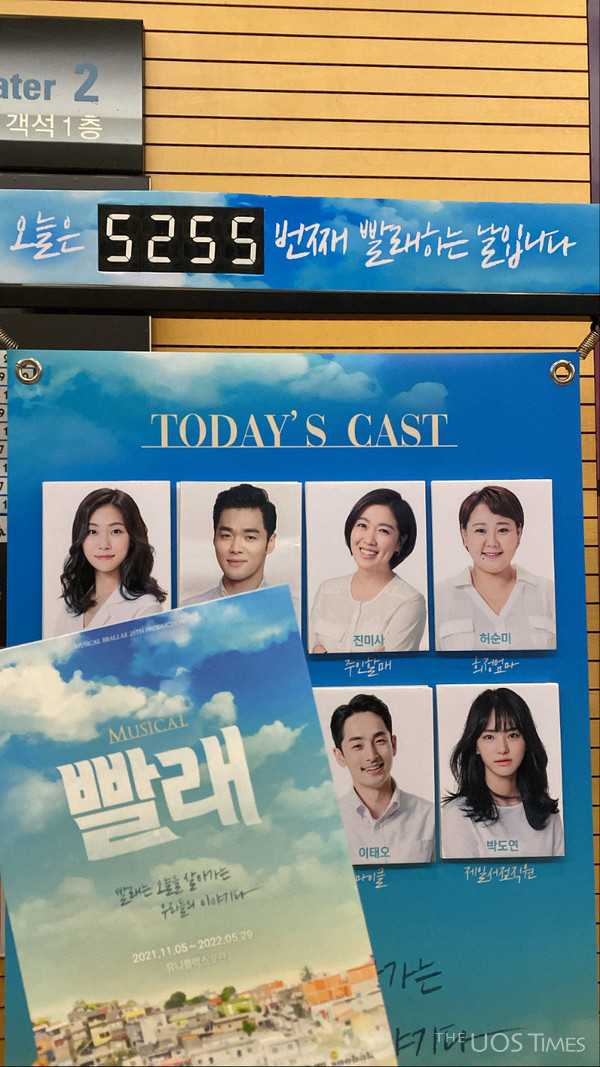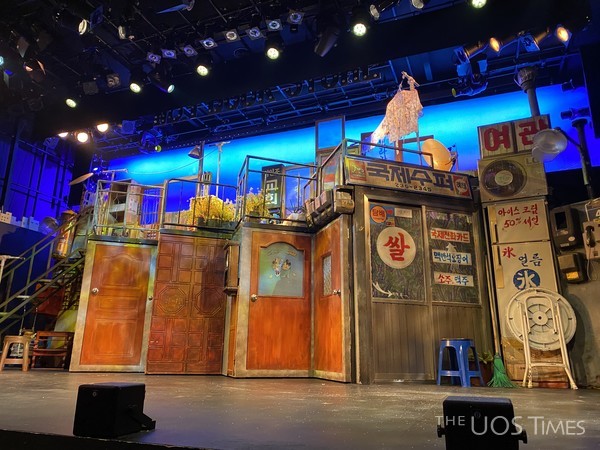Plot
Na-young is one of the many single householders in Seoul. She left her hometown and has lived in Seoul for five years. Living in the semi-basement where she moved in for the sixth time, she seems to be losing her dream, so the days when she can't sleep are getting longer.
Solingo, a Mongolian young man who came to Korea to make money, gets closer to Na-young due to the laundry being blown over the wall by the wind.
Meanwhile, Na-young is also disadvantaged while confronting the bookstore owner who unfairly fired her co-worker. Na-young comes back home and cries; her neighbors comfort her with their stories.

The musical “Laundry” is a Korean creative musical. It contains the hardships of the working population, support between neighbors, and the stories of people living their daily lives. The musical began with a graduation performance at the Korea National University of Arts in 2003 and officially premiered as a commercial work in 2005. Since then, more than 5,000 performances have been held at various theaters in Daehak-ro for about 17 years. The musical won several awards in recognition of directing the lives of Seoul citizens with warm eyes. In addition, it has established itself as a unique creative musical performance that has been recognized for both quality and popularity and was also introduced in middle and high school Korean language textbooks in 2012.
Popular musicals mainly consist of unrealistic storytelling, huge stage equipment, and famous actors. However, the musical “Laundry” pays attention to "realism." It asks the audience questions about social issues, such as migrant workers, women's basic rights, and the disabled, which have rarely been dealt with in other musicals.
In addition, there are no dramatic stories or cool characters in this musical. Solingo, the main character of “Laundry,” is a migrant worker from Mongolia. He came to Seoul to earn money for his younger brother's tuition and treatment for his sick parents. Solingo means rainbow in Mongolian. As can be seen from the lyrics of his song, Mongolians call Korea a place where the rainbow rises. This is because they think Korea is a place where they can dream of a hopeful and beautiful future like a rainbow - similar to the “American dream.” Thus, he came to Korea following a beautifully spread rainbow, but now he lives under a sky full of dark clouds. Working in a factory, he is ignored by people just because he is a foreign worker without being duly recognized for the amount of labor he did and even receiving a delayed salary.
In this way, just by looking at the fact that the migrant worker is the main character of the musical, it can be seen that the musical "Laundry" intends to show the audience the unfair reality with a critical gaze. By this plot structure, the audience sympathizes with and understands the pain and loneliness of those who are always around us but have not thought carefully.
The UOS Times asked one of the college students their impressions after watching the musical "Laundry."
The musical “Laundry” highlights the lives of people with difficulties in our society, including the disabled, migrant workers, tenants, and service workers. The content unfolds by focusing on the difficulties they face, but it was good to show hope that their lives could get better.
In the musical, there are unilateral power structures between the employers and employees, landlords and tenants, factory owners and workers. It is not easy for employees, tenants, and workers to rebel against people with power for fear of being disadvantaged no matter how unfair they are. In addition, the scene where a service center employee mocked the disabled landlord's daughter revealed a subtle prejudice and disregard toward the disabled, which is common in society. However, I felt that the musical “Laundry” is a play where I could feel the hope of continuing to live with the love of family, lover, and neighbors even in their difficult lives.
I like the scene where the old woman (Na-young’s house owner) and Hee-jung's mother comfort Na-young when Na-young is crying after seeing her co-worker gets fired unfairly. They also have endured difficult times like Na-young, taking care of a sick daughter, doing business hard, so the comfort they gave touched my heart more. I hope many people can feel hope and be moved by the musical “Laundry.”

The musical “Laundry” is not based on historical events or love stories, but on social problems and stories of people who are common around us or ourselves. Thus, the reason why it has been loved by many people for a long time is probably because of these critical characteristics.
The musical “Laundry” contains a message to brush off tiresome and sad emotions like dusting off while doing laundry. It may be the story of the people around us or our own. The UOS Times recommends this musical, which shows the dark side of our society sharply and does not lose its wit, making it more sympathetic and friendly.
You can book the musical “Laundry” on this site. Also, if you are hesitant to book this musical, The UOS Times encourages you to decide after watching this video.

